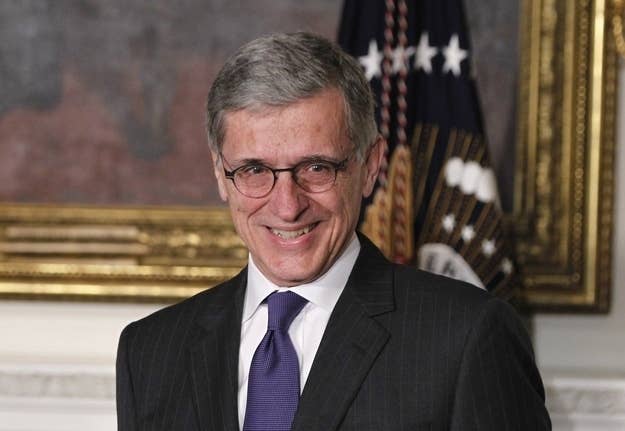
Last night, in the same venue that hosted this year's White House Correspondents' Dinner, over 1,600 communications industry professionals — lobbyists, lawyers, regulators — gathered together for what insiders call the "Telecom Prom." On stage, freshly appointed FCC Chair Tom Wheeler rattled off some jokes. "Understand the priorities of the new chair," he teasingly suggested to lobbyists in the audience. "For example, if he's a grandfather, don't wait to ask him to pull out the pictures of the grandchildren."
Wheeler put on a good show. But at some tables, the topic centered around another performance by the chairman, delivered a few days earlier at Ohio State University. During a Q&A session following the chairman's first formal public address, he uttered a surprising line. Asked about tiered internet access and "data hogs," he said the following:
I think we're also going to see a two-sided market where Netflix might say, 'Well, I'll pay in order to make sure that you might receive, my subscriber might receive, the best possible transmission of this movie.' I think we want to let those kinds of things evolve.
To net-neutrality supporters, who want to prevent internet service providers from prioritizing, or charging for, different types of internet traffic, this was extremely alarming. Michael Weinberg, a vice president at pro-net-neutrality nonprofit Public Knowledge, sounded the alarm immediately. "This is, of course, exactly the type of market that net neutrality is designed to prevent," he wrote the next day. "If Chairman Wheeler's version of net neutrality is different from everyone else's version of net neutrality, we need to know that sooner rather than later."
A spokesperson for Free Press, another pro-net-neutrality group, told BuzzFeed, "We are concerned about the two-sided market," and pointed us to a blog post on the organization's site. "There was a lot to like" about the speech, the post says, but the answers given during the Q&A "were more than a little troubling."
It continues: "Allowing ISPs to charge for prioritization would encourage artificial scarcity, depress competition, harm online innovation and threaten the very existence of the open Internet."
Wheeler's past as a cable and wireless industry lobbyist, as well as an enthusiastic response to his appointment from AT&T and Comcast, put internet watchdog groups on high alert all the way back in May. Wheeler has since tried to assuage worries, to little effect. In November, Fortune described Wheeler's goals for net neutrality to be "anybody's guess."
Wheeler did not address the Ohio State comments during his speech at the Federal Communications Bar Association dinner last night, despite considerable pressure from the press. "It was certainly something people were talking about on the floor," said Public Knowledge's Weinberg. "I did talk to some folks on the FCC staff, and they're clearly aware that this is a thing." The closest he came was a spectrum joke: "There's a good supply of good wine here tonight, but it's a limited supply, so AT&T and Verizon, we're going to have to ask you to limit."
In response to a request for comment, an FCC staffer supplied excerpts from the chairman's speech, suggesting that its content was a better representation of his views, and noting that during the same Q&A, the chairman expressed general support for net neutrality.
To critics of net neutrality, the speech came as a more welcome surprise. "Especially with this Ohio State speech, it sounds like Wheeler is a little more industry friendly than [former chairman] Genachowski was," says Brent Skorup of the libertarian Mercatus Center at George Mason University says. "I think that's what Public Knowledge and Free Press are worried about."
"And frankly I think his Ohio State speech about allowing usage-based pricing, and penalizing data hogs, and openness to two-sided markets — I can't remember Genachowski speaking as well about those sorts of things," Skorup told BuzzFeed. It wasn't until the Q&A session that the word "neutrality" was used; in the relatively brief speech, however, "market" and "markets" were invoked over a dozen times.
A lot rides on an upcoming court decision, due soon, regarding the enforcement of the FCC's Open Internet Order, a somewhat soft but largely pro-net-neutrality regulation drafted and instituted during Genachowski's tenure. Verizon filed a lawsuit against the FCC, claiming that it did not have the authority to enforce such rules, and the DC Court of Appeals recently heard oral arguments. It's unclear which way it will go: If the FCC loses, and important parts of the OIO are stuck down, the FCC can either attempt to take the case to the Supreme Court or reclassify broadband as a common carrier telephone service, which would give it clearer authority to regulate.
"I don't think the FCC would contemplate Title II classification," says Skorup. "We may go back to the way it was 10 years ago, with ex-post enforcement," he says, referring to a case-by-case enforcement situation his organization would be happy with, and which alarms net-neutrality advocates. It would, essentially, hand the issue of net neutrality to antitrust courts.
For now, both sides are holding their breath. An FCC oversight hearing scheduled for next week will require testimony from all five FCC commissioners, who will be asked for broad updates on the commission's policies. "The conventional wisdom expectation is, if he's going to address this, that would be the logical place to do it," says Weinberg. "It's pretty clear that the FCC and [Wheeler's] office are aware these comments raise concerns," he says. "The ball is in their court."
